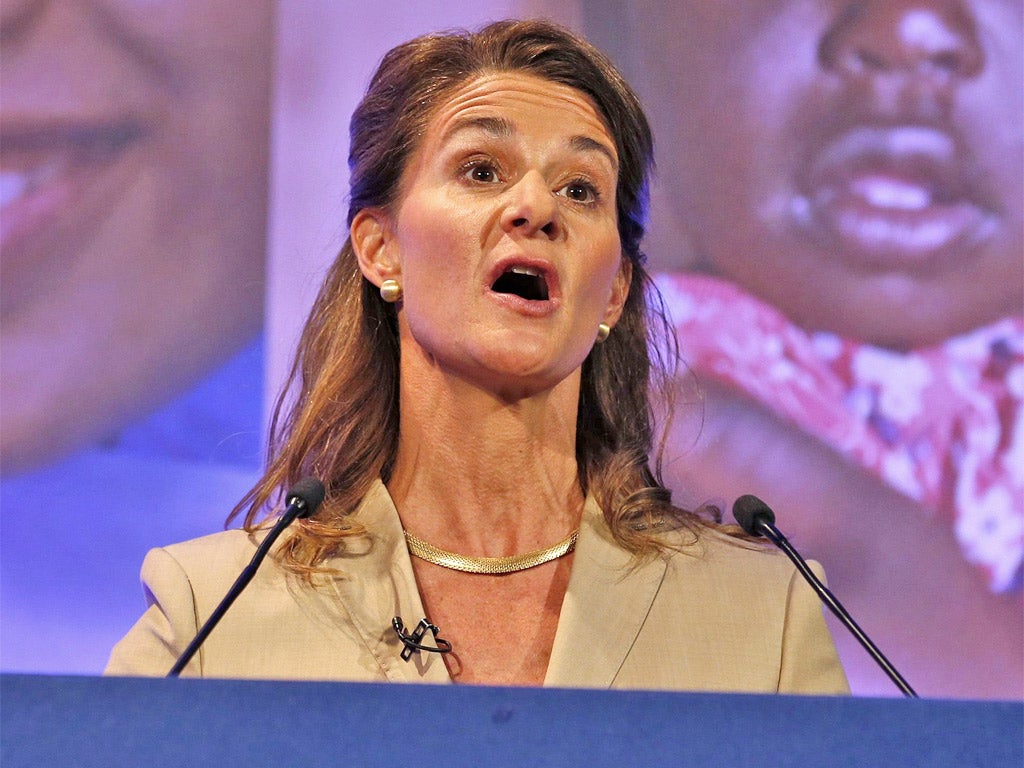Catholic Melinda Gates defies the Vatican over birth control funds
Philanthropist reveals £360m grant to prevent unwanted pregnancies in poorer countries

Melinda Gates, billionaire philanthropist and practising Catholic, yesterday laid down the gauntlet to the Vatican by vowing to dedicate her life to improving access to contraception for women in the developing world.
At an extraordinary summit in London, Mrs Gates announced that the charitable foundation she set up with her Microsoft founder husband Bill was donating $560m to family planning services.
The size of the donation is intended to emphasise the Bill and Melinda Gates Foundation’s commitment to reducing unwanted pregnancies in poorer countries, which experts say lead to more than 100,000 women dying prematurely every year.
A life-long Catholic, Mrs Gates said she had grappled with her faith before deciding to speak out against the Vatican’s opposition to contraception.
“Of course I wrestled with this. As a Catholic I believe in this religion, there are amazing things about this religion, amazing moral teachings that I do believe in, but I also have to think about how we keep women alive,” she said in an interview in advance of the summit.
“I believe in not letting women die, I believe in not letting babies die, and to me that’s more important than arguing about what method of contraception [is right].”
The summit, co-hosted by the Gates Foundation and Department for International Development, started with a remarkable declaration by the Indian government pledged to provide free access to family planning for all 64 million women currently denied the opportunity to control when and how many children to have.
Cash pledges then came in thick and fast from world leaders, with more than £3bn by the end of the day, Almost half of contribution were from developing countries.
David Cameron was given a standing ovation after announcing Britain is doubling its financial support for family planning services to £1bn over the next eight years, but was immediately asked how he would tackle religious opposition to the efforts.
He said Britain’s contribution would save the life of a woman or girl in the developing world every two hours for the next eight years by preventing deaths caused by too many pregnancies, too close together.
Mr Cameron and Andrew Mitchell, international development minister, were widely praised for showing leadership and commitment to women’s health, though the funding is not new money and will come out of existing aid budgets.
Australia and Germany both agreed to double their contributions for family planning programmes. Nigeria, where only one in 10 couples currently use contraception, announced a 300 per cent increase in funds.
In total, the summit raised nearly enough money to expand family planning programmes to an extra 120 million women.
In her speech Mrs Gates said: "What we're doing is an enormous undertaking… We're committed to innovating constantly; we're committed to educating women about their options… It is a difficult task but it is absolutely urgent."
Mr Cameron said: "When a woman is prevented from choosing when to have children it is not just a violation of her human rights it can fundamentally compromise her chances in life and the opportunities for her children.
"Family planning works not just because smaller families can be healthier and wealthier but because empowering women is the key to growing economies and healthy open societies."
Mr Cameron added: "We're not talking about some kind of Western imposed population control, forced abortion or sterilisation.
"What we're saying today is quite the opposite. We're not telling anyone what to do. We're giving women and girls the power to decide for themselves."
An estimated 220 million women around the world do not have access to contraceptives or family planning information.
In some countries women need written consent from their husbands before they can talk to a doctor about contraception while in others, family planning services are not offered to adolescents or unmarried women. In others, contraceptives are frequently out of stock when women need them.
For the past two decades vaccinations against infectious diseases have been pursued as the global health priority at the expense of contraception and family planning. But a series of papers published in The Lancet earlier this week concluded that addressing the unmet need for contraception was crucial if Millennium Development Goals on maternal deaths, poverty and gender equality were to be ever achieved.
And a recent report from Save the Children said every year one million teenage girls die or is injured because of pregnancy or childbirth – making pregnancy is the biggest killer of teenage girls worldwide.
Mrs Gates said the Foundation had initially focussed on vaccines because women would not choose to have fewer children until they were sure their children would survive childhood
In address by video link, Aung Sang Suu Kyi told delegates that giving women control over family planning would lead to healthier, better educated women and children for the future.
“Reproductive rights are basic human rights,” said Hillary Clinton.
Bill and Melinda: A labour of love
The Bill and Melinda Gates Foundation was set-up by the Microsoft founder and his wife in 1994. Since then it has become a significant player in global development and health. As co-chairs of the Foundation, the Gates' are intimately involved in its work.
Latest figures show that the foundation has funded $26.2bn worth of programmes and grants, including more than $6bn for libraries, scholarships, emergency relief, schools and homelessness in the United States.
Global health is their first love, on which more than $15bn has been spent so far. They are probably best known for their work on Malaria, vaccines and HIV/Aids, but have also invested significantly in research and treatments for diarrheal diseases, TB and pneumonia which costs millions of lives every year. They have offices in India and China where large programmes of work are focused.
Join our commenting forum
Join thought-provoking conversations, follow other Independent readers and see their replies
Comments